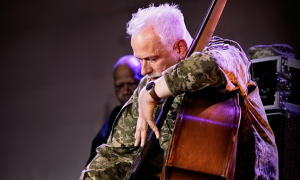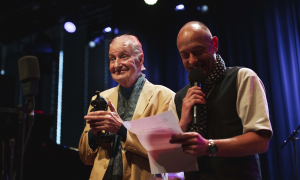Home » Jazz Articles » Profile » The Ganelin Trio: Creative Tensions
The Ganelin Trio: Creative Tensions

That noise was the
The trio's visit carried with it a frisson of the illicit, the idea that this music was an act of rebellion. There was that thrill of the underground and of Samizdat—that indignation on behalf the oppressed. A whole drama was projected onto their very existence. The anticipation was always going to be more glorious than the consummation.
The first real hearings in the West actually came at least ten years after their formation. Pianist
Vyacheslav Ganelin
pianob.1944

Vladimir Chekasin
saxophoneb.1947

Vladimir Tarasov
drumsb.1947
It spoke of oppression and the triumph of the human creative spirit. It gave a glimpse into a world that conjured images of clandestine gatherings of musicians and fans, a subterranean Beatnik otherness at once authentic and brave. It spoke of opposition.
It doesn't matter how much or how little of our imaginings were located in the reality of their experience. There's simply no way that our 'reality' was anything more than our own artificial construct. They were doomed with expectations they could never fulfil. They could simply never be as 'real' as in our imagination. They could never transcend our vision of what they should be. And that's sad, because they were in many ways better than that and deserved better.
Music always derives from relationships and improvised music, in particular, derives from creative tensions in relationships—the collective versus the individual, the performing individual versus the watching/listening audience. Life's a bit like that, too! The first contradiction or tension within the Ganelin Trio was (inter-)personal. By all accounts, the partnership between Ganelin and Chekasin had become fraught by the mid-eighties.
Chekasin's playing and performance reflected some kind of unpredictable force or drive and an inclination to tomfoolery that was a powerful dynamic in some of the trio's best moments. Ganelin was more solid, disciplined and elegant. Clowning for him required a certain licence in both senses of the phrase. Structure and freedom, in effect, embodied in two of its principals—a wonderful tension while it lasted but, ultimately, it could not.
This personal tension was reflected in different musical influences. British jazz critic John Fordham perceptively suggested that on Non Troppo (hatArt CD 6059), Ganelin plays as if

George Shearing
piano1919 - 2011

Cecil Taylor
piano1929 - 2018
Those contradictions of a Russian free jazz growing in isolation, fed by radio broadcasts and the expensive, illicit

Ornette Coleman
saxophone, alto1930 - 2015

John Coltrane
saxophone1926 - 1967
It's ironic that their one recording, or at least available recording, with 'Western' players is one of their least successful. San Francisco Holidays (Leo CD LR208/9) features the

Rova Saxophone Quartet
saxophoneIt's hard not to see GeTeChe (the group's initials and the way they were known at home) as embodying many of the contradictions of Soviet society, between totalitarianism and socialism and consumerism. Eventually, those contradictions would tear the Soviet Union apart. There's the irony of an indigenous jazz music emerging in a totalitarian society, in the sense that jazz is a music of freedom and emancipation. But there's the also the irony in the fact that our attempts to make sense of the phenomenon necessitate our projection on to their reality.
Take the place humour and burlesque assume in the trio's music on record and in performance—largely the same thing here, though as pointed out subsequently composition played a larger part in the trio's music than we assumed initially. A surreal, clownish humour also underpinned the work of fellow Russians Sergei Kuryokhin and Jazz Group Arkhangelsk. Comparisons that we might make here between, for example, the

Art Ensemble Of Chicago
band / ensemble / orchestra
Willem Breuker
saxophone1944 - 2010
In practice, the Ganelin Trio was never the main gig for any of them. Ganelin taught in the Conservatoire in Vilnius and was the musical director for the Russian Drama Theatre there. Tarasov worked primarily as a percussionist with two symphony orchestras in Lithuania, while Chekasin was/is an educator of some note. Clearly, the trio was important to all three—important enough, perhaps, for them to reform, fifteen years after their break-up, for a brief European tour in 2003, which was when I actually saw them perform. But was there also an ambivalence there as well? One might want to hold a butterfly but would not expect it to survive the attention.
Perhaps one of the other reasons the trio disappointed some on their 1984 visit, was that their modus operandi as an improvising group was 'suspect.' Later it became clear that composition was (almost) as important in GeTeChe's music as improvisation. I am also not sure that that particular part of the scene was ready for the buffoonery. I don't think I'm being too unfair in suggesting that the free improv scene could, at the time, take itself a bit too seriously, if only out of a natural defensiveness arising because much of the music biz never took them at all seriously.
And so we come to the records. In 1985, I spent a day wandering round Moscow's record shops in 1985 looking for Con Anima (Melodiya 1976). The best, I could find was a track on a compilation of Soviet Jazz. A few days after I got back I wandered into a record fair in the small market town where I worked and found New Wine, now part of Old Bottles (Leo CD LR112.) It am still not sure why but it was my key into a whole lot of other stuff. Perhaps, it was their use of the standard, "Too Close For Comfort," that gave me the shape and structure to follow it through.
New Wine is alive and healing and, for GeTeChe anyway, light. Non Troppo, which precedes it, is by contrast stately, tragic and elegant. In some ways this makes it the most accessible of the trio's CD's. Ancora Da Capo (Leo CD LR108) has been less favourably reviewed in the past. Some have found it fragmentary and uninspired. Fractious might be a better word. One's fantasy might involve a dressing room spat before the gig(s). But it remains an important work reflecting a different and seemingly very personal side to the group.
Encores (Leo CD LR106) is precisely that and, to these ears, is the most dispensable of their recordings. Amongst their own numbers, it features versions of "Summertime" and "Mack The Knife." (San Francisco Holidays also features a performance of the Brecht-Weill standard.) These two Ganelin performances seem just too cold and calculated—the joke just isn't that funny!
But the jewel of the collection is Catalogue: Live in East Germany (Leo CD LR102). Music of any kind is rarely this good. It's a series of performances from 1977-82 and perhaps reveals a group that found its rationale, surpassed itself before passing its peak. It was in those years that the trio came to our attention. And that's the final irony. We only caught their late flowering.
"Catalogue" offers a good description of its store-setting of the group's virtues, of their use of formal themes and structures, even of occasional use of theme and variation and their capacity for improvisational frenzy. This is the 'must-buy' of the set. In 1987, Slava Ganelin finally got permission to emigrate to Israel. And that was the end of the trio, until their brief reformation in 2003. We got to see maybe a third of their existence. But it is probably easier now to see the trio for what they were. A highly articulate, expressive and brave elaboration of a received form transposed and transformed in an alien or at least new context. The music is not consistent, in either conception or execution. At its best it has a brilliance, surprise and wonder that just is the best of its kind. At its worst it is rarely less than unusual and distinctive. Just listen to Catalogue, to Poco A Poco (Leo CD LR101), Old Bottles and the best of Ancora Da Capo. The Ganelin Trio were truly one of the greatest jazz trios of all time.
This article is adapted from a piece that Duncan Heining wrote for Avant Magazine in 1998.
Tags
Ganelin Trio
Profiles
Duncan Heining
Russian Federation
Vyacheslav Ganelin
Vladimir Chekasin
Vladimir Tarasov
George Shearing
Cecil Taylor
Ornette Coleman
John Coltrane
Rova Saxophone Quartet
Sergei Kuryokhin
Jazz Group Arkhangelsk
Art Ensemble of Chicago
Willem Breuker
Comments
PREVIOUS / NEXT
Support All About Jazz
 All About Jazz has been a pillar of jazz since 1995, championing it as an art form and, more importantly, supporting the musicians who make it. Our enduring commitment has made "AAJ" one of the most culturally important websites of its kind, read by hundreds of thousands of fans, musicians and industry figures every month.
All About Jazz has been a pillar of jazz since 1995, championing it as an art form and, more importantly, supporting the musicians who make it. Our enduring commitment has made "AAJ" one of the most culturally important websites of its kind, read by hundreds of thousands of fans, musicians and industry figures every month.





 Buy Now
Buy Now























